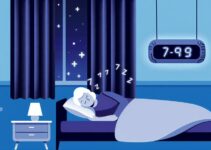Imagine your body as a well-oiled machine, with each component relying on the others to function optimally. Now, picture your sleep as the crucial maintenance period for this intricate mechanism. Just as every part of the machine requires proper care and attention to perform at its best, so too does your body, particularly when it comes to testosterone production. But what exactly does sleep do for natural testosterone levels? Stay tuned to uncover the surprising interplay between sleep and testosterone regulation, and how a good night's rest might be the missing piece in your quest for optimal hormone balance.
Key Takeaways
- Getting enough quality sleep is crucial for maintaining healthy testosterone levels in men.
- Sleep disturbances like sleep apnea or insomnia can negatively affect testosterone production.
- Testosterone levels fluctuate throughout the day in a circadian rhythm, with the highest levels during REM sleep in the early morning hours.
- Deep sleep promotes muscle recovery and growth, enhances protein synthesis and muscle strength, and regulates cortisol and insulin, all of which influence testosterone production.
Importance of Sleep for Testosterone
Getting enough quality sleep is crucial for maintaining healthy testosterone levels in men. Sleep hygiene plays a significant role in hormonal balance, including testosterone production. When you consistently get less than the recommended 7-9 hours of sleep per night, it can disrupt your hormonal balance, leading to a decrease in testosterone levels. Sleep deprivation affects the body's ability to regulate stress hormones, which in turn can impact testosterone production. Inadequate sleep also interferes with the body's ability to recover and repair itself, which is essential for maintaining optimal hormonal balance.
Furthermore, poor sleep can lead to increased insulin resistance, which has been linked to lower testosterone levels. It is important to note that both the quantity and quality of sleep are crucial for maintaining healthy testosterone levels. Even if you are getting the recommended hours of sleep, poor sleep quality, characterized by frequent awakenings or an inability to reach deep sleep stages, can still negatively impact your hormonal balance. Therefore, prioritizing good sleep hygiene is essential for supporting natural testosterone levels in men.
Sleep Quality and Testosterone Production
You need to understand how sleep quality directly impacts your body's production of testosterone. The amount and quality of REM sleep you get can have a significant impact on testosterone levels. Research indicates that disturbances in sleep patterns, such as sleep apnea or insomnia, can negatively affect testosterone production.
Sleep and Testosterone
Quality sleep plays a crucial role in regulating and maintaining healthy testosterone production in the body. Sleep patterns directly impact hormonal balance, including testosterone levels. When you consistently get inadequate or poor-quality sleep, your body's ability to produce testosterone may be compromised. Research has shown that sleep deprivation can lead to reduced testosterone levels, impacting not only physical health but also mood and cognitive function. During sleep, the body undergoes essential processes that support hormone regulation and overall health, including the release of growth hormone and the restoration of tissues. Adequate, good-quality sleep, especially during the deep sleep stages, is vital for optimizing testosterone production. Prioritizing healthy sleep habits and addressing any sleep disorders can positively influence testosterone levels and contribute to overall well-being.
REM Sleep Impact
During REM sleep, the body undergoes intricate physiological processes that have a significant impact on testosterone production and overall hormonal regulation. The relationship between REM sleep and hormone levels is crucial for maintaining optimal testosterone production. Here's how REM sleep impacts testosterone levels:
- Stress Reduction: REM sleep helps reduce the impact of stress on hormone levels, promoting a more balanced testosterone production.
- Hormonal Regulation: During REM sleep, the body regulates the release of hormones, including testosterone, which is essential for overall physiological balance.
- Neurological Restoration: REM sleep supports neurological restoration, which in turn influences the regulation of hormone levels, including testosterone.
- Mood and Energy: Adequate REM sleep positively affects mood and energy levels, which can indirectly impact testosterone production.
Understanding the impact of REM sleep on testosterone levels underscores the importance of quality sleep for overall hormonal health.
Circadian Rhythm and Testosterone Levels
The natural fluctuations of testosterone levels throughout the day, known as the circadian rhythm, play a crucial role in regulating various physiological processes in the body. Hormone balance is intricately tied to the circadian rhythm, with testosterone levels peaking in the early morning and gradually decreasing throughout the day. This pattern is closely linked to sleep patterns, as testosterone production is at its highest during the rapid eye movement (REM) stage of sleep, which predominantly occurs in the early morning hours. Disruptions to the circadian rhythm, such as irregular sleep patterns or shift work, can significantly impact testosterone levels and hormone balance.
Understanding the interplay between the circadian rhythm and testosterone levels is essential for optimizing overall health. Testosterone influences not only reproductive functions but also muscle mass, bone density, and energy levels. Disruptions to the circadian rhythm can lead to imbalances in testosterone levels, potentially contributing to a range of health issues. Establishing healthy sleep patterns and maintaining a consistent sleep-wake cycle can help support the natural fluctuations of testosterone levels and promote overall hormone balance.
Deep Sleep and Testosterone Synthesis
During deep sleep, your body undergoes a crucial process of testosterone synthesis, which is essential for the maintenance of overall hormone balance and physiological function. This period of rest is vital for optimizing your testosterone levels, and here's why:
- Testosterone and muscle recovery: Deep sleep plays a significant role in promoting muscle recovery and growth. During this phase, your body releases growth hormone, which aids in repairing and rebuilding muscle tissues. Testosterone, synthesized during deep sleep, further supports this process by enhancing protein synthesis and promoting muscle strength.
- Sleep and hormone balance: Adequate deep sleep is essential for maintaining a healthy hormone balance, including testosterone levels. Disruptions in sleep patterns or insufficient deep sleep can lead to decreased testosterone synthesis, potentially impacting overall hormone balance and physiological function.
- Hormonal regulation: Deep sleep allows for the regulation of various hormones, including cortisol and insulin, which in turn can influence testosterone production. Adequate deep sleep helps to keep these hormones in balance, supporting optimal testosterone synthesis.
- Overall health and well-being: Deep sleep not only supports testosterone synthesis but also contributes to overall health and well-being, including cognitive function, mood regulation, and immune system function.
Sleep Duration and Testosterone Regulation
To optimize your testosterone regulation, ensuring an adequate sleep duration is crucial for maintaining hormone balance and overall physiological function. Sleep duration plays a significant role in testosterone secretion and overall hormone balance. Research has shown that sleep deprivation can lead to hormone imbalance, particularly affecting testosterone levels. Sleep patterns, including both the duration and quality of sleep, have been linked to fluctuations in testosterone levels. One study found that men who slept for less than 5 hours per night for a week had significantly lower levels of testosterone compared to those who had a full night's sleep. Another study revealed that even a single night of sleep deprivation can result in a reduction of testosterone levels by up to 10-15%. These findings highlight the importance of prioritizing sufficient sleep to support healthy testosterone regulation. Therefore, maintaining consistent and adequate sleep patterns is essential for optimizing testosterone secretion and overall hormonal balance.
Tips for Optimizing Sleep for Testosterone
Prioritize consistent and sufficient sleep duration to support optimal testosterone secretion and overall hormonal balance. Adequate sleep hygiene and a supportive bedroom environment are crucial for maximizing testosterone levels. Here are four tips for optimizing sleep to enhance testosterone production:
- Maintain a Regular Sleep Schedule: Aim to go to bed and wake up at the same time every day, even on weekends. Consistency helps regulate your body's internal clock, promoting better hormonal balance, including testosterone production.
- Create a Relaxing Bedroom Environment: Keep your bedroom cool, dark, and quiet to promote quality sleep. Consider using blackout curtains, white noise machines, or earplugs to minimize disturbances that could disrupt your sleep and impact testosterone levels.
- Limit Screen Time Before Bed: The blue light emitted by electronic devices can interfere with your body's natural sleep-wake cycle. Minimize exposure to screens at least an hour before bedtime to promote better sleep quality and hormonal balance.
- Manage Stress and Anxiety: Practice relaxation techniques such as meditation, deep breathing exercises, or gentle yoga before bed to reduce stress and promote restful sleep, which can positively impact testosterone levels.
Frequently Asked Questions
How Does Sleep Impact Testosterone Levels in Women?
Getting enough sleep is critical for hormonal balance in women's health. It impacts testosterone levels, influencing energy, muscle mass, and libido. Sleep deprivation disrupts hormonal regulation, potentially leading to imbalances and adverse health effects.
Can Napping During the Day Affect Testosterone Production?
Napping can significantly benefit testosterone levels by supporting hormone regulation and maintaining a healthy circadian rhythm. When you nap, you provide your body with vital rest that helps optimize testosterone production and overall hormonal balance.
Are There Specific Foods or Supplements That Can Improve Sleep Quality and Testosterone Levels?
To improve sleep quality and testosterone levels, consider consuming foods rich in magnesium like spinach, almonds, and pumpkin seeds. Additionally, supplements such as melatonin and ashwagandha have been shown to support better sleep and potentially increase testosterone production.
Does Sleep Deprivation Have a Long-Term Impact on Testosterone Levels?
Consistently poor sleep quality, especially due to long-term sleep deprivation, can significantly impact your testosterone levels. Research shows that inadequate sleep disrupts hormone production and regulation, leading to decreased testosterone levels over time.
Are There Any Sleep Disorders That Particularly Impact Testosterone Production?
Sleep apnea and insomnia can significantly impact testosterone production. Quality sleep is crucial for hormone regulation. Disrupted sleep patterns can lead to decreased testosterone levels, affecting overall health and well-being.
Conclusion
You've learned that sleep plays a crucial role in regulating your testosterone levels. By prioritizing quality sleep, you can optimize testosterone production and maintain a healthy hormonal balance. Make sure to create a sleep environment that promotes deep, restful sleep, and aim for a consistent sleep schedule to align with your body's circadian rhythm. With these strategies in place, you can support your body's natural testosterone synthesis and regulation.



